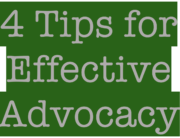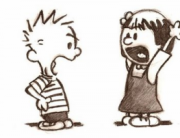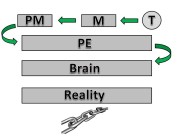I got a lot of feedback about my previous post on what not to say to a depressed person. I, myself, realized, after I finished writing, that my list seemed to eliminate most of the seemingly helpful things people actually say to depressed people, along with some of the more useless pieces of advice. So, have I thrown the baby out with the bathwater? I don’t think so, but let me explain. The purpose of the list was to describe, for people who don’t suffer from depression, what the mind can do to even objectively harmless and pro-social encouragement when it is weighed down under a cloud of darkness. The most positive and encouraging sentiments are quickly corroded in the acid bath of negativity, rendering them unhelpful at best and harmful at worst. This naturally leads to the question, “So, if I can’t even tell them that I love them, what can I say to them?” Check out this list of suggestions:
1. That must feel terrible…
I’ve written before about the importance of validation, especially when it comes to getting someone to listen to your perspective. Much of the usual feedback given to depressed people is intended to be encouraging (i.e. we love, we’re proud of you, you’re not ugly, you’re beautiful, everyone likes you). Exasperatingly, these efforts at elevating their mood often make things worse. I addressed the mechanics of that in my last post. So, instead of trying to encourage them right off the bat, start by validating their view of the world. That doesn’t mean you agree with it. It just means that you try to understand it and communicate that understanding to them. “Man, I don’t know how you do it every day. Going to school when you hate school so much and feel so unwelcome there. I don’t know if I would be strong enough to go through that every day.” It must be genuine, though, not acted out. The depressed person is hypervigilant for patronization so don’t be guilty of that offence. Believe it or not, validating and showing empathy goes much further than reflexive encouragement and negation of another person’s ideas and insights.
2. Do you want me to help you?
We assume that if a person is talking to us about their depression or showing clear signs of depression that they are asking for help but maybe they’re not. Maybe they just want to talk to us, not with us. Maybe they already know the solution and the answers to their big questions but they get some kind of payoff from chewing on the gristle every now and then. Perhaps not. The best way to know is to ask.
3. How can I help?
If they do want your help, don’t assume that you know how to do it. Ask for their input. Sometimes allowing them to feel in control of the process is the tipping point between hopelessness and hope. Sometimes they want someone else to come and rescue them from themselves. Sometimes it’s a combination of the two. Maybe they just need you to call in sick for them. Maybe the need you to loan them a few bucks. Maybe they want you to pray for them. Again, if they want your help, ask them to help you help them.
4. Do you want me to try to talk you out of it?
Don’t assume that talking is part of the solution. Maybe they are happy being depressed. Just because it bums you out doesn’t mean that you need to change it. Often depression, even the deepest and darkest kind, is cyclical and self-corrects. The person may know this. They may not want you to teach them something. They may want to be the teacher.
5. Do you need some time and space to think or do you want to be around people?
This is another important thing to consider. Giving someone space might be seen as rejection. Not giving them space might be experienced as smothering. Ask the expert. We often think that what we want is what everyone wants and we might be quick with a comforting hug, or to pass the Kleenex, but we should always ask the other person whether that works for them.
6. When was the last time you felt like this?
This will help both you and them to know if this is a chronic situation or related to recent events. If it is chronic, it is less likely to be changed by any intervention on your part. If it is new and recent, then it has a greater chance of being related to external events and therefore a greater chance of being addressed and “fixed”.
7. How long do you usually feel like this?
If it is a chronic or recurring condition, asking this question may remind them that it is a temporary state and that while in the midst of the darkness it is difficult to remember that there has ever been any light. However, the fact that it is recurring suggests that there is the occasional reprieve. Also, if they report that it usually lasts for x amount of time, then that is the amount of time that you can allow for things to correct on their own. If the depression persists past that point, then perhaps there is something more serious going on.
8. Have you seen the new Weird Al video parody?
Distraction is not always bad. Sharing some impersonal fun with the person, fun that requires no obligation, no graciousness, no generosity, no altruism or anything similar is a great way to get those reward chemicals pumping in the brain. It’s not a lasting cure or anything but it might help to get the engine running again. And who doesn’t love Weird Al:
Note:
i. People don’t want always want you to tell them that you love them. They just want you to love them. That means actions. In terms of what actions, I recommend becoming acquainted with Gary Chapman’s 5 Love Languages so that your efforts are efficiently pointed in the right direction.
ii. You will note that all but the first suggestion on the list are questions. That’s not an accident. We always need to guard against the human tendency to assume. Always ask first.
iii. When trying to communicate with a seriously depressed person, questions may not elicit grandiose flowing responses. They may extract only mumbled “I don’t know” statements or perhaps even nothing at all. Remember that a non-response is actually a response. If I ask someone how I can help and they don’t answer, it doesn’t necessarily mean that they’re not listening, or that they’re not responding. A non-response could mean that they are thinking about their answer. It could mean they want to be left alone. It could mean that they want you to keep asking, to show how much you really care you have to work for it. Try not to get frustrated with the non-responsive response. It just requires more work on your part.
iv. Gabor Mate, addiction and ADHD specialist, says, “If you’re going to be with an alcoholic, then be with him. But don’t be with him and resent him at the same time.” He was speaking to an audience of mental health professionals but the sentiment applies equally to friendships and family relationships. Frustration at a slow pace, resentment at the burden, and related feelings will only exacerbate depression. If you are not a strong swimmer, you can’t be the lifeguard. That’s OK. You haven’t let anyone down. You just might need to find someone who can swim better to help you out. That might mean either convincing the depressed person to get professional help, or getting some for yourself so that you can carry the load without getting crushed.



















































Recent Comments